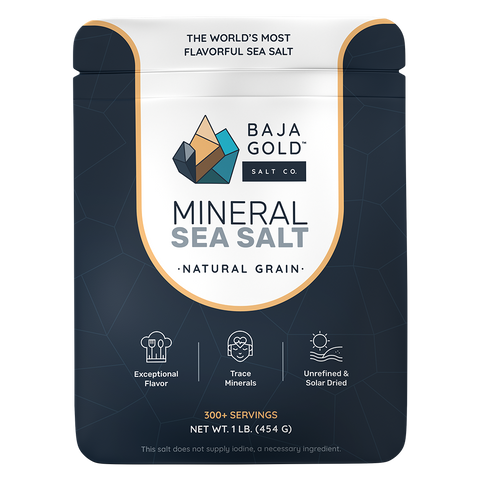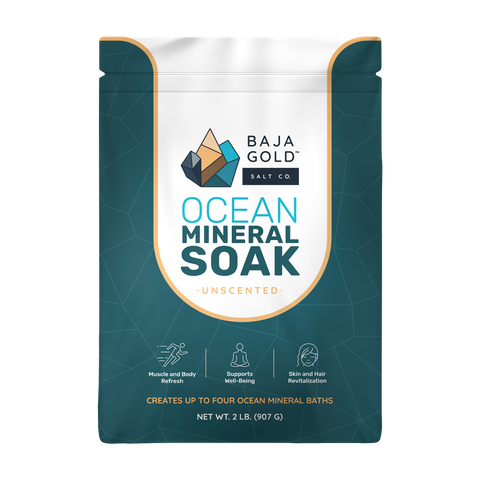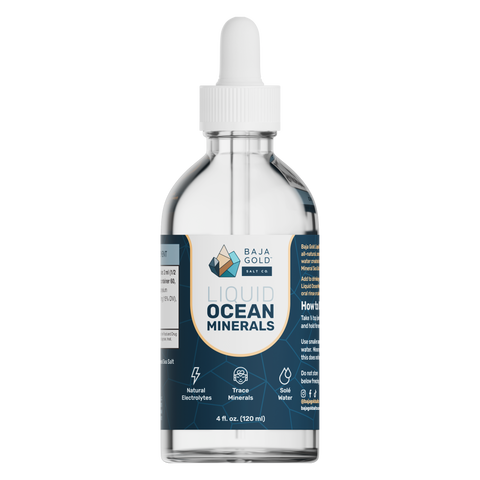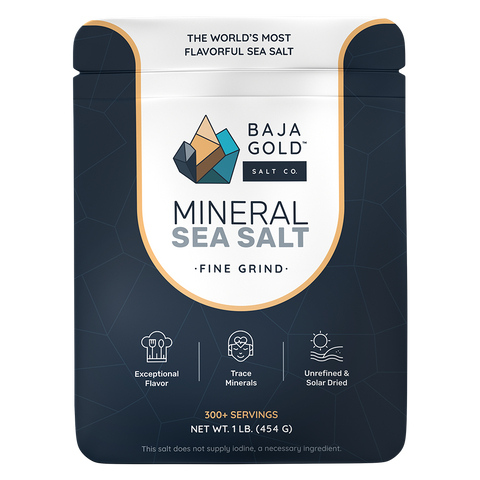What Are Trace Minerals and Why Your Body Needs Them

Trace minerals are essential nutrients that the body needs in very small amounts—typically less than 100 milligrams per day—to support key functions like immune response, energy production, and other bodily processes that move you from day to day.
Have you ever wondered how your body is able to do all of the amazing stuff it does? While you might know about sodium and magnesium, there's a family of nutrients that work behind the scenes in tiny amounts to keep you healthy - trace minerals.
Trace minerals are essential nutrients that the body needs in very small amounts—typically less than 100 milligrams per day—to support key functions like immune response, energy production, and other bodily processes that move you from day to day. Unlike major minerals like calcium and potassium that you need in larger amounts, trace minerals work as catalysts for many of your body's most important processes.
At Baja Gold Salt Co., we believe understanding these essential nutrients is a key to better health – so let's talk about what they do, where to find them, and why they matter.
What Are Trace Minerals? (and How They're Different from Other Minerals)
Trace minerals—also called trace elements or essential trace elements—are a group of essential nutrients your body needs in very small amounts to stay healthy. That means you don’t need much of them each day—but if you don’t get enough, serious health problems can follow.
So what makes a trace mineral “trace”? It comes down to quantity. Major minerals like calcium, magnesium, and potassium are required in larger amounts (hundreds of milligrams or more per day), while trace minerals are only needed in micrograms or a few milligrams.
But don’t let the tiny dosage fool you. Trace minerals help regulate:
- Blood pressure
- Muscle contraction
- Energy production
- Cognitive development
- Immune function
- And other metabolic processes

The Most Important Trace Minerals (and What They Do)
Let’s take a closer look at some of the essential trace minerals your body needs.
Iron
- Function: Helps form red blood cells and transport oxygen
- Deficiency Risks: Iron-deficiency anemia, especially common among women and children
- Sources: Organ meats, whole grains, breakfast cereal, legumes
Zinc
- Function: Supports immune function, wound healing, and cognitive development
- Deficiency Risks: Slow healing, frequent colds, skin issues
- Sources: Meat, seafood, fortified grains, dairy products
Copper
- Function: Works with iron to produce red blood cells, helps with iron absorption, aids in muscle function
- Deficiency Risks: Copper deficiency can lead to anemia, bone fragility, and health problems
- Sources: Shellfish, organ meats, nuts
Iodine
- Function: Supports thyroid hormone production
- Deficiency Risks: Iodine deficiency may cause goiter, fatigue, or slowed growth
- Sources: Table salt, seaweed, dairy products, eggs
Other Noteworthy Trace Elements
- Selenium: Protects cells from oxidative damage
- Fluoride: Prevents tooth decay and strengthens healthy bones
- Chromium: Helps regulate blood sugar
- Manganese: Supports energy production and bone health
-
Molybdenum: Supports enzyme function
These minerals all work together in harmony—so balance matters more than excess.
Where Do We Get Trace Minerals in Our Diet?
Eating a wide variety of whole, minimally processed foods is the best way to get the trace minerals your body needs.
Natural food sources include:
- Organ meats – High in iron, copper, and zinc
- Whole grains – Provide iron, selenium, and manganese
- Dairy products – Contain iodine and zinc
- Seafood – Excellent source of iodine, selenium, and zinc
- Whole grain cereals – A common dietary source of iron and other essential trace minerals
Table Salt and Iodine
In the United States, most table salt is iodized to help reduce the risk of iodine deficiency. Without enough iodine, your body can’t produce sufficient thyroid hormone, which is essential for regulating metabolism and supporting development, especially during pregnancy and early childhood.
But iodized salt isn’t the only option. Mineral salts are unrefined and naturally rich in a wide variety of essential trace elements, including magnesium, potassium, calcium, and more. While they may contain lower levels of iodine compared to iodized salt, they offer a broader mineral profile that supports muscle function, energy production, and overall wellness.
Adding mineral salt to your diet is a flavorful and natural way to support your body’s trace mineral needs – especially when used alongside other iodine-rich foods like seafood, seaweed, and dairy products.

When Supplements Are Needed
In some cases, your diet may fall short. People at higher risk of deficiency may benefit from a mineral supplement or dietary supplement, especially:
- Pregnant women
- People with restricted diets (like vegetarians and vegans)
- Older adults
- Individuals with absorption issues
Still, it’s best to talk to a healthcare provider before starting any new supplements. Too much of a trace mineral can be just as harmful as too little.
What Happens When You Don't Get Enough Trace Minerals?
Deficiencies in essential trace elements may not show up overnight – but over time, the effects can be serious. Even in the United States, where food is widely available, certain groups are at risk of deficiency.
Common trace mineral deficiencies and symptoms:
Iron deficiency
- Causes fatigue, pale skin, and poor muscle function
- Can lead to iron-deficiency anemia, especially in pregnant women
Zinc deficiency
-
Leads to delayed wound healing, weak immune system response, and skin issues
Iodine deficiency
- Affects thyroid hormone production, potentially causing goiter or slowed development in children
Copper deficiency
- May lead to low red blood cells, brittle bones, or increased risk of infection
- People with poor diets, restrictive eating patterns, or certain medical conditions may benefit from targeted mineral supplementation – but again, a healthcare provider should guide this.
How to Maintain a Healthy Balance of Trace Minerals
Here’s how to make trace minerals a reliable part of your lifestyle:
- Eat real food first – Focus on unprocessed items like whole grains, organ meats, and seafood
- Choose natural sources of salt – Unrefined salts like those from Baja Gold Salt Co. may contain a broader range of essential minerals
- Consider supplements – Only use mineral supplements or dietary supplements if recommended by a healthcare provider
- Monitor for overconsumption – Too much of a good thing can lead to mineral imbalances
- Test when necessary – Blood tests can identify deficiencies in nutrients like iron, zinc, and copper
Trace Minerals Deserve a Place on Your Plate
Trace minerals might not get the spotlight like protein or carbs, but they’re essential to your health from head to toe. From forming red blood cells to preventing tooth decay, their roles are too important to ignore. Whether it’s through nutrient-rich food or unrefined sea salt like Baja Gold, getting enough trace minerals helps your body work the way it’s meant to.
If you’re unsure about your intake, check in with a healthcare provider – because in nutrition, the smallest things can make the biggest difference.



